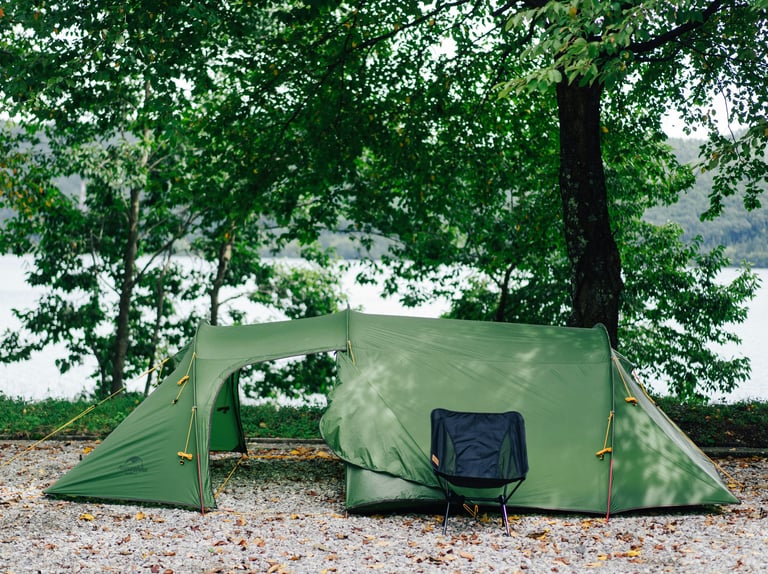How to Reduce Your Environmental Footprint While Camping: Simple Tips for a Greener Adventure
ECO FRIENDLY


Camping is one of those activities where we get to connect with nature, unwind, and recharge. But as much as we love being in the great outdoors, it's important to remember that our little adventures can leave a lasting impact on the environment. Fortunately, there are plenty of simple ways we can enjoy camping while reducing our environmental footprint. Here are some easy, low-effort tips to help you have an eco-friendly camping trip.
1. Choose Eco-Friendly Campsites
First things first: try to camp in places that prioritize sustainability. Many national parks and eco-conscious campgrounds are taking steps to protect the environment. These spots might have better waste management, more sustainable practices, or be more protected from over-tourism. Before you book, check out the site's eco-credentials or look for campsites that have "Leave No Trace" guidelines.
2. Travel Light – And Smart!
The less gear you bring, the less you need to transport, and that means less fuel consumption if you're driving or using public transport. Aim to pack only what’s necessary and focus on high-quality, durable items that will last you years to come. Instead of buying single-use items, invest in reusable items like a durable water bottle, a sturdy coffee mug, or a reusable camping stove.
3. Leave No Trace: Pack Out What You Pack In
This one’s a no-brainer. Whatever you bring to the campsite, take it back with you. Trash, food scraps, and even things like toilet paper should be packed out if they’re not biodegradable. Carry a trash bag and a compostable bag for food waste. Make sure to leave your campsite just as beautiful as you found it—if not more!
4. Opt for Biodegradable and Eco-Friendly Products
When it comes to soap, shampoo, and toothpaste, regular products can contaminate waterways. Look for biodegradable options that won’t harm the environment. There are plenty of eco-friendly camping products out there, from shampoo bars to plant-based cleaning supplies. And don't forget your sunscreen—choose one that’s reef-safe to avoid harming aquatic ecosystems.
5. Go Solar
Campgrounds might have electricity, but if you're not near one or just prefer to go off the grid, solar-powered chargers are a game-changer. Small, portable solar panels can charge your devices or power your campsite lights. The sun’s energy is clean, renewable, and free, so why not harness it while you're outdoors?
6. Be Careful with Firewood
If you’re planning to have a campfire (who doesn’t love a good campfire?), make sure you're using local, sustainably sourced firewood. This helps prevent the spread of invasive species and reduces the need for cutting down trees. Avoid collecting wood from the forest floor or chopping down living trees. Many campgrounds offer firewood for purchase, which can be a more eco-friendly option.
7. Keep Noise and Light Pollution to a Minimum
One of the best things about camping is the chance to disconnect and enjoy the peaceful sounds of nature. By reducing unnecessary noise, you can preserve the tranquility of your surroundings. Similarly, light pollution is real, and it messes with ecosystems. Opt for low-impact lighting (like a headlamp or lantern) and avoid bright, disruptive lights.
8. Respect Wildlife (and Stay Safe)
When you're out camping, you might encounter some wildlife. It's tempting to feed them or get close for a cool photo, but that’s actually harmful to both you and the animals. Wild animals depend on their natural food sources, so feeding them messes with their diets and behavior. Plus, keeping your distance helps prevent risky encounters, keeping both you and the animals safe.
9. Choose Eco-Friendly Food Options
Food waste is a major environmental issue, and camping can contribute to it if we're not careful. Plan your meals and pack only what you'll realistically eat. Try bringing non-perishable, plant-based foods like grains, nuts, and dried fruits—they have a lower environmental impact compared to meat. And if you do cook with meat, try to choose sustainably sourced options like grass-fed beef or local, organic products.
10. Leave the Area Better Than You Found It
This is one of the best ways to reduce your environmental footprint. If you see litter, pick it up—even if it’s not yours! By being mindful of the area around you and doing a quick clean-up after your trip, you can help make the outdoors a little bit cleaner for the next adventurer.
Camping is a blast, and it’s also one of the best ways to appreciate the beauty of our planet. But the more we learn to minimize our impact, the longer we’ll get to enjoy these stunning places. Small, thoughtful changes in how we camp can make a world of difference. So the next time you hit the trail, remember that even the smallest action—like choosing eco-friendly gear, respecting wildlife, or packing out your trash—helps protect the natural beauty we all love.
